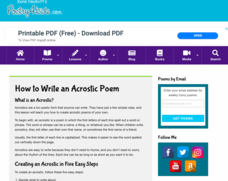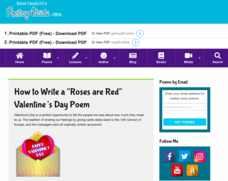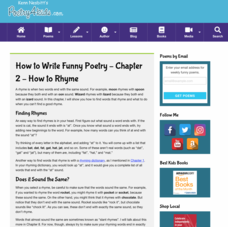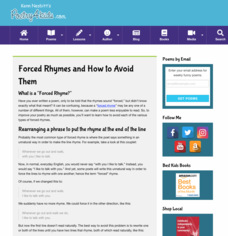Curated OER
Everyone Can Write Poetry
Embark on a journey of writing several different types of poetry. Fifth graders read several examples, and use the examples to model their own writing. Each poem is to be accompanied by a different art visual representation. In the end,...
National Endowment for the Humanities
Poems that Tell a Story: Narrative and Persona in the Poetry of Robert Frost
Dig in deeper with Robert Frost's, "Stopping by Woods on a Snowy Evening." Learners will read and discuss poems by Robert Frost and learn the meaning of terms such as narrative and personal. They journal, collaborate, and present poetry...
Curated OER
Creating a Memorial Day Poster Poem
Does your class know about the meaning of Memorial Day? Discuss the history of the holiday in this lesson, which prompts elementary and middle schoolers to create word webs of ideas about the holiday. Additionally, they create poems...
Poetry4kids
How to Write an Acrostic Poem
Acrostic poems are perfect for any topic! A quick tutorial guides learners into writing acrostic poems with the basics and key examples.
Poetry4kids
How to Write a Repetition Poem
A repetition poem is the focus of a lesson that challenges scholars to compose an original piece. To add meaning to their poem, authors choose words to repeat at the start of most lines.
Poetry4kids
How to Write a “Roses are Red” Valentine’s Day Poem
Compose a Valentine's Day poem! Practicing their rhyming skills, scholars follow the traditional format to create a happy poem for a friend or family member.
Poetry4kids
How to Write a Fractured Nursery Rhyme
Scholars take a popular song or nursery rhyme and make it their own as they write a fractured nursery rhyme. Writers seek out a nursery rhyme's rhyming words and change them to create an original poem.
Poetry4kids
How to Write a Clerihew
Writing funny poems is the best part about learning poetic forms! Young poets learn all about clerihews—humorous four-line poems about people—with an explanatory lesson.
Poetry4kids
How to Write a Diamante Poem
A lesson begins with a description of a diamante poem and the rules to follow while writing one. Scholars examine the ins and outs of synonym and antonym diamantes, then compose an original poem using their newfound knowledge.
Poetry4kids
How to Write a Free Verse Poem
Budding poets compose an original free verse poem. Encouraged to use personification and alliteration, scholars read over three tips and examples then try their hand at drafting a poem of their own style.
Poetry4kids
Evoking the Senses in a Poem
Budding poets choose a topic for a sensory-filled poem. Authors describe that topic using detailed language based on the five senses. Then, switch the senses to create a fanciful poem intended to add a touch of fun to the objective.
Poetry4kids
How to Write a Cinquain Poem
A lesson challenges scholars to create a cinquain poem. Writers begin by choosing a topic and brainstorm details, then compose their original poem making sure to count syllables.
Roy Rosenzweig Center for History and New Media
War and Poetry
A band of brothers or the Devil's agents? Nobel warriors freeing the oppressed or mercenaries working for the military/industrial complex? Groups examine poems from the Civil War, World War I, and World War II to determine the poets'...
Poetry4kids
How to Write Funny Poetry — Chapter 2: How to Rhyme
Funny poems don't have to rhyme—but it helps! Learn how to use rhyming words to add humor to funny, clever, or just plain silly poems.
Poetry4kids
How to Write a Traditional “Mother Goose” Nursery Rhyme
There may be some little lambs, itsy bitsy spiders, and pumpkin eaters in your language arts class! An online poetry lesson takes learners through the steps of writing a nursery rhyme with easy-to-follow steps and explanatory examples.
ReadWriteThink
Diamante Poems
The blank page can be a huge hurdle to overcome when writing a poem. Take that hurdle away with an interactive format that enables pupils to write elegant diamante poems. After they add the first and last words in two separate fields,...
Poetry4kids
Rhythm in Poetry: The Basics
What makes a great poem sound so good? Learn the rhythmic secrets of poetry with an explanatory online lesson.
BW Walch
“Outsider” Poet Kay Ryan Goes from Poetry Club Reject to Poet Laureate
The cat might have got your tongue, but you can’t avoid the elephant in the room while you wait for the other shoe to drop. After all, the early bird gets the worm and the chickens are circling. After researching Poet Laureate Kay Ryan...
ReadWriteThink
Acrostic Poems
What is an acrostic poem? It is one of the many forms of poetry that expresses a particular thought, idea, emotion, or feeling. Play with an interactive that allows young poets to craft a topical acrostic of their choice using an online...
Poetry4kids
How to Write a Silly Song Parody
Imitation is the sincerest form of flattery—and it's a great way to learn about poetic structure! Young poets use familiar tunes to write a song parody based on straightforward guidelines.
Curated OER
Introduction to Poetry Part I-- The Three Pillars of Poetry
In these poetry writing worksheets, students learn the power of words and the ability of the poet to say a great deal with a few well-chosen words. Students learn the 3 pillars of poetry: Emotion (makes you feel something), Image (makes...
Poetry4kids
How to Write a Funny Epitaph Poem
What can happen if you eat too much cafeteria food? Or wear dirty clothes every day? Or talk back to your mother? Use a lesson on humorous poems as a way for students to practice silly rhymes as fictional epitaphs.
Poetry4kids
How to Write a Tanka Poem
Take your haikus to the next level with tanka poems, another form of Japanese poetry that regulates the length and rhythm of each line by syllables. Young writers read the explanation, examples, and tips for tanka poems before writing...
Poetry4kids
Forced Rhymes and How to Avoid Them
Ready to take your poetry writing to the next level? Use an independent lesson to iron out all those forced rhymes, wrenched rhymes, and near rhymes from first-draft poems.
Other popular searches
- Writing Poetry Onomatopoeia
- Writing Poetry Third Grade
- Writing Poetry and Prose
- Creative Writing Poetry
- Writing Poetry Rhyming Poems
- Descriptive Writing/poetry
- Writing Poetry Unit
- Writing Poetry Lesson Plans
- Poetry Writing Workshop
- Writing Concrete Poetry
- Writing Poetry On
- Teaching Poetry Writing

























